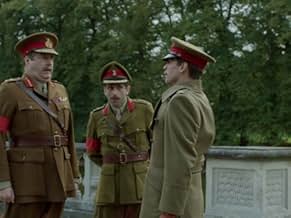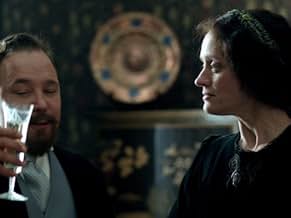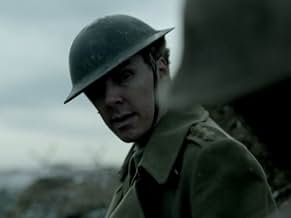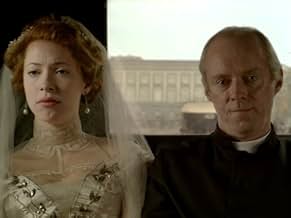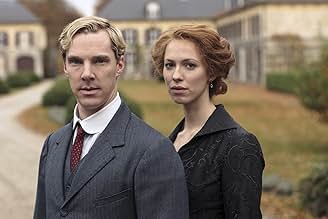Revolves around a love triangle between a conservative English aristocrat, his mean socialite wife and a young suffragette.Revolves around a love triangle between a conservative English aristocrat, his mean socialite wife and a young suffragette.Revolves around a love triangle between a conservative English aristocrat, his mean socialite wife and a young suffragette.
- Nominated for 5 Primetime Emmys
- 8 wins & 36 nominations total
Browse episodes
Featured reviews
Not since A Dance to the Music of Time has such a stellar cast been allied to such an artful and unusual script.
Ford Madox Ford is not a popular novelist. His work often approaches its subjects on an elliptical curve, his principal characters are seldom in the mainstream of society, forming odd relationships, requiring his audience to assimilate their understanding of them over the course of a whole work rather than categorise from their experience (or jump to conclusions based on genre). This explains why we don't see his work adapted very often. Or even at all.
Susanna White and Tom Stoppard have both grasped the nettle of demonstrating this sideways approach, though I'm not sure quite so many kaleidoscopic shots were necessary to drive the point home. Benedict Cumberbatch joins in, underlining his character's isolation with some rather off-putting facial gestures. Ronald Hines played Tietjens in the now lost 1960's adaptation and casting to type may have worked better than struggling with toning down the matinée idol status Cumberbatch has acquired since hitting Sherlock Holmes out of the park. Maybe if he and Stephen Graham had swapped roles the other characters might have found it easier to deal with Tietjens' self-enforced oddity but that may have impaired Ford's central point, beautifully delivered as the the climax to Episode 4.
But acting idiosyncrasies cannot mask the quality of the fabulous script or the overall adaptation which has a towering performance from Rebecca Hall and glittering additions from Rufus Sewell, Rupert Everett, Miranda Richardson, Roger Allam, Ann-Marie Duff and beautiful, note-perfect newcomer Adele Clemens.
With so much glossy soap about, it is extremely refreshing to have high quality, thought-provoking, challenging drama this good whatever the lead chooses to do with his jaw muscles.
A keeper.
Ford Madox Ford is not a popular novelist. His work often approaches its subjects on an elliptical curve, his principal characters are seldom in the mainstream of society, forming odd relationships, requiring his audience to assimilate their understanding of them over the course of a whole work rather than categorise from their experience (or jump to conclusions based on genre). This explains why we don't see his work adapted very often. Or even at all.
Susanna White and Tom Stoppard have both grasped the nettle of demonstrating this sideways approach, though I'm not sure quite so many kaleidoscopic shots were necessary to drive the point home. Benedict Cumberbatch joins in, underlining his character's isolation with some rather off-putting facial gestures. Ronald Hines played Tietjens in the now lost 1960's adaptation and casting to type may have worked better than struggling with toning down the matinée idol status Cumberbatch has acquired since hitting Sherlock Holmes out of the park. Maybe if he and Stephen Graham had swapped roles the other characters might have found it easier to deal with Tietjens' self-enforced oddity but that may have impaired Ford's central point, beautifully delivered as the the climax to Episode 4.
But acting idiosyncrasies cannot mask the quality of the fabulous script or the overall adaptation which has a towering performance from Rebecca Hall and glittering additions from Rufus Sewell, Rupert Everett, Miranda Richardson, Roger Allam, Ann-Marie Duff and beautiful, note-perfect newcomer Adele Clemens.
With so much glossy soap about, it is extremely refreshing to have high quality, thought-provoking, challenging drama this good whatever the lead chooses to do with his jaw muscles.
A keeper.
The show was a very intelligent yet slow paced adaptation of very high quality source material. Sometimes I got impatient in certain episodes, but am glad that I stayed the course. Benedict cumberbatch was OUTSTANDING in the role. Just brilliant. His expressions, that quiver of emotion...it said much more than words. There were some deep moments, very poignant as well. Some witty ones also. I would have rated it 7.5 if option was there. Just stay with this show, it will be a rewarding experience.
I don't like watching series or movies based on the wars but I watched this because of Benedict Cumberbatch and I have fallen in love with this series. I have not read the novels or have any idea about the writer but if the books are even half as good as the TV adaptation, they must be a must- read. Christopher Teijens is a brilliant, very committed and decent gentleman. He has a wife who cheats on him and he is love with a girl. At the backdrop is the world war 1. If you are looking for a story, there is not much of it but the true star of the show is the direction, cinematography, amazingly poetic dialogues and unblemished acting by the whole cast. The music compliments the settings and the backdrop very well. Benedict Cumberbatch has shown the world how talented he is. Flawless acting, deep emotions and superb voice modulations. Rebecca Hall and Adelaide Clemens have made the characters of Sylvia and valentine unforgettable.
Don't watch this if you are a fan of fast paced action. This is for patient, connoisseurs of literature and romantics. Watch it for intelligent viewership.
Don't watch this if you are a fan of fast paced action. This is for patient, connoisseurs of literature and romantics. Watch it for intelligent viewership.
I'm sure that HBO marketing execs were relieved that, if they were going to get behind a 5-part series based on Ford Madox Ford's complex and not terribly well known 20th-century masterpiece, at least some of it would be set in a stately home in the north of England, like that other show about the downtown abbey.
Ford's a great one for interior monologue and multiple points of view and such, but Tom Stoppard's masterly adaptation channels the great muddy river of his prose into a lively, involving narrative—though there's still enough time-shifting and flashbacking, even some Eisenstein-style montage, to do honor to Ford's avant-garde intentions. Considering what difficult material he's dealing with, it's one of the best TV adaptations ever!
Benedict Cumberbatch has always done well in period films, and he seems like the only possible choice for Christopher Tietjens, a self-styled 18th-century gentleman (the time period of the series is roughly 1908-19) and omniscient civil servant, but obstinate, brusque and arrogant as well (maybe even a little like Sherlock?). Rebecca Hall is riveting and surprisingly sympathetic as Tietjens's deceitful wife, Sylvia, and Aussie actress Adelaide Clemens is a revelation as Valentine, the virginal suffragette he meets and falls in love with in two of the series's most powerful scenes. (Tietjens and Sylvia, though usually at cross-purposes, are determined not to divorce—it's complicated .)
Tietjens is described by one of his wife's admirers as a "bloody great bolster" of a man—BC didn't have time to bulk up for the part, obviously—but he emerges as a poignant, even romantic, figure, with only the memory of the night he falls in love with Valentine to sustain him through six years of frustration, disappointment and danger. Perhaps it's easy to see why some viewers didn't find this storyline or this character very "relatable."
Long story short, '"Parade's End" isn't as accessible as an original costume drama devised for a contemporary audience, like "Downton," but it's decidedly worth watching. We didn't have a problem with BC's enunciation, but some of the dialogue, especially in the scenes with excited Welsh soldiers in the trenches, is admittedly not so easy to follow. (Next time we'll try the subtitles.) Great cinematography; kudos to the first-rate British cast, with special mention to Stephen Graham as Tietjens's fair-weather friend Macmasters and Rufus Sewell in a Pythonesque turn as a sex-crazed clergyman. An interview with Stoppard on disc two sheds some light on his process.
Ford's a great one for interior monologue and multiple points of view and such, but Tom Stoppard's masterly adaptation channels the great muddy river of his prose into a lively, involving narrative—though there's still enough time-shifting and flashbacking, even some Eisenstein-style montage, to do honor to Ford's avant-garde intentions. Considering what difficult material he's dealing with, it's one of the best TV adaptations ever!
Benedict Cumberbatch has always done well in period films, and he seems like the only possible choice for Christopher Tietjens, a self-styled 18th-century gentleman (the time period of the series is roughly 1908-19) and omniscient civil servant, but obstinate, brusque and arrogant as well (maybe even a little like Sherlock?). Rebecca Hall is riveting and surprisingly sympathetic as Tietjens's deceitful wife, Sylvia, and Aussie actress Adelaide Clemens is a revelation as Valentine, the virginal suffragette he meets and falls in love with in two of the series's most powerful scenes. (Tietjens and Sylvia, though usually at cross-purposes, are determined not to divorce—it's complicated .)
Tietjens is described by one of his wife's admirers as a "bloody great bolster" of a man—BC didn't have time to bulk up for the part, obviously—but he emerges as a poignant, even romantic, figure, with only the memory of the night he falls in love with Valentine to sustain him through six years of frustration, disappointment and danger. Perhaps it's easy to see why some viewers didn't find this storyline or this character very "relatable."
Long story short, '"Parade's End" isn't as accessible as an original costume drama devised for a contemporary audience, like "Downton," but it's decidedly worth watching. We didn't have a problem with BC's enunciation, but some of the dialogue, especially in the scenes with excited Welsh soldiers in the trenches, is admittedly not so easy to follow. (Next time we'll try the subtitles.) Great cinematography; kudos to the first-rate British cast, with special mention to Stephen Graham as Tietjens's fair-weather friend Macmasters and Rufus Sewell in a Pythonesque turn as a sex-crazed clergyman. An interview with Stoppard on disc two sheds some light on his process.
Parade's End is Tom Stoppard's new adaption of Ford Madox Ford's First World War novel. One knew it was going to be good as soon as one noticed that the novelist's first and last name were the same – a sure sign of a serious and thoughtful writer.
The series stars Benedict Cumberbatch as Christopher Tietjens – a tightly wound, deeply honourable English gentlemen with an annoying penchant for not having sex with beautiful women who want to have sex with him. They pursue him, they flirt with him, they sometimes get down on their knees and beg him, but old Christopher doesn't want to know. He is far too busy being tightly wound and deeply honourable.
Directly by Susannah White, Parade's End is BBC costume drama at its most costumy, with plenty of expensive tweed, pinched in waistlines, and heaving powdered cleavage.
For daily TV reviews visit Mouthbox.co.uk
Cumberbatch must have watched many thousands of hours of Edward Fox movies, as he seems to have perfectly mastered Fox's uniquely contorted lower facial expression – that of pressing one's lips together and using one's cheek muscles to somehow force one's down-turned mouth painfully southwards towards the chin.
Rebecca Hall, (daughter of Sir Peter) plays Tietjens' beautiful but sex-starved socialite wife, who on one occasion strips naked in front of her husband, only to be told that he can't bear to turn away from the wall and look at her. On another occasion the poor woman is so desperate for intercourse that she jumps into a taxi in London, drives hundreds of miles to where he is fighting in France, and practically throws herself on top of him in the trenches. Meanwhile, Christopher's sagging mouth slides further and further down his face as he daydreams about his beautiful suffragette admirer Valentine (Adelaide Clemens), and what it might be like to not have sex with her again when he returns home to Blighty.
Clearly Parade's End is intelligent, beautifully crafted drama, without the TV soap-like qualities of the more mainstream Downton Abbey, and Benedict Cumberbatch is destined to become one of our finest serious actors. That is, of course, if he manages to avoid being cast as Doctor Who.
The series stars Benedict Cumberbatch as Christopher Tietjens – a tightly wound, deeply honourable English gentlemen with an annoying penchant for not having sex with beautiful women who want to have sex with him. They pursue him, they flirt with him, they sometimes get down on their knees and beg him, but old Christopher doesn't want to know. He is far too busy being tightly wound and deeply honourable.
Directly by Susannah White, Parade's End is BBC costume drama at its most costumy, with plenty of expensive tweed, pinched in waistlines, and heaving powdered cleavage.
For daily TV reviews visit Mouthbox.co.uk
Cumberbatch must have watched many thousands of hours of Edward Fox movies, as he seems to have perfectly mastered Fox's uniquely contorted lower facial expression – that of pressing one's lips together and using one's cheek muscles to somehow force one's down-turned mouth painfully southwards towards the chin.
Rebecca Hall, (daughter of Sir Peter) plays Tietjens' beautiful but sex-starved socialite wife, who on one occasion strips naked in front of her husband, only to be told that he can't bear to turn away from the wall and look at her. On another occasion the poor woman is so desperate for intercourse that she jumps into a taxi in London, drives hundreds of miles to where he is fighting in France, and practically throws herself on top of him in the trenches. Meanwhile, Christopher's sagging mouth slides further and further down his face as he daydreams about his beautiful suffragette admirer Valentine (Adelaide Clemens), and what it might be like to not have sex with her again when he returns home to Blighty.
Clearly Parade's End is intelligent, beautifully crafted drama, without the TV soap-like qualities of the more mainstream Downton Abbey, and Benedict Cumberbatch is destined to become one of our finest serious actors. That is, of course, if he manages to avoid being cast as Doctor Who.
Did you know
- TriviaBenedict Cumberbatch claimed that his character of Christopher Tietjen was one of the more admirable he has ever played. He claimed "[Christopher] has many admirable qualities I'd like to siphon off into my life."
- GoofsSylvia and Bobbie smoke cigarettes, but several others certainly would have been smokers, including the Ladies Macmaster, Wonnop, Satterthwaite, Marie-Leonie, and Claudine.
- ConnectionsFeatured in The Wright Stuff: Episode #17.165 (2012)
- How many seasons does Parade's End have?Powered by Alexa
Details
- Release date
- Countries of origin
- Language
- Also known as
- Geçit Töreni Sonu
- Filming locations
- Duncombe Park, Helmsley, York, North Yorkshire, England, UK(Groby Hall: Tietjens family's country estate)
- Production companies
- See more company credits at IMDbPro
Contribute to this page
Suggest an edit or add missing content


